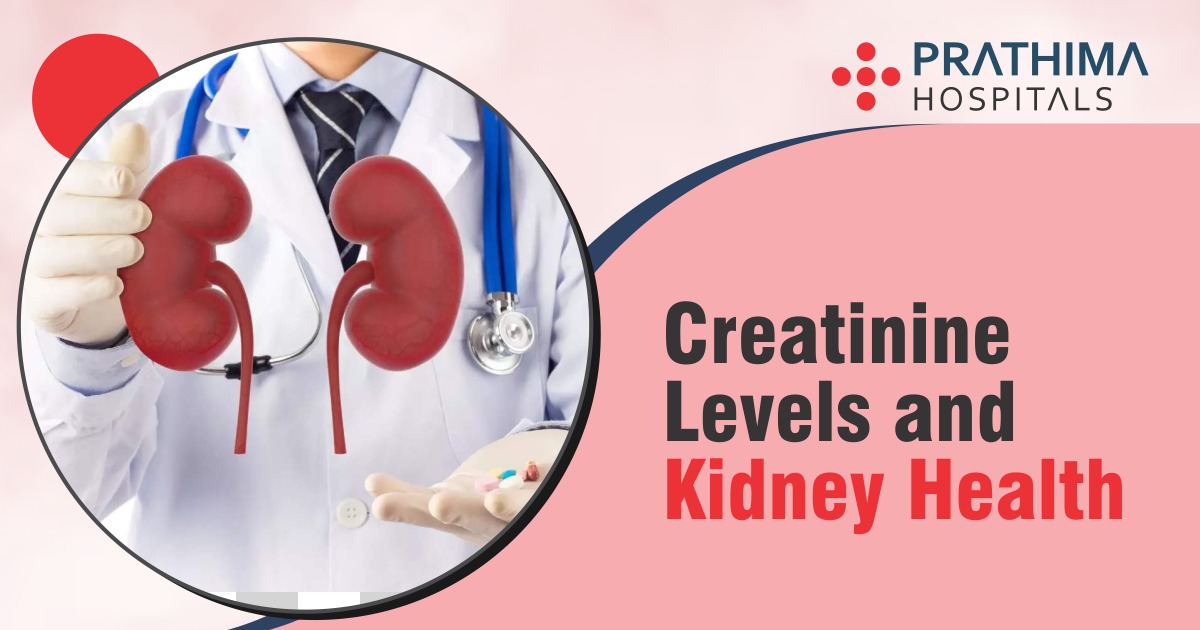Creatinine Levels and Kidney Health: What You Should Know!

Factors That Affect Kidney Health
Introduction:
The kidneys play a crucial role in maintaining overall health by filtering waste products and excess fluids from the blood, thereby regulating the body’s internal environment. One of the key indicators of kidney health is the measurement of creatinine levels in the blood. Creatinine is a waste product from muscles that the kidneys remove from the blood. According to the Best Nephrologist in Hyderabad Monitoring creatinine levels is essential for assessing kidney function and detecting potential kidney problems. In this comprehensive guide, we will delve into the significance of creatinine levels, their measurement, factors affecting them, and strategies to maintain optimal kidney health.
The Significance of Creatinine Levels:
Creatinine is a byproduct of creatine, a compound found in muscles that is used for energy production. It is released into the bloodstream at a relatively constant rate and is eventually filtered by the kidneys. As kidney function declines, the ability to clear creatinine from the blood is impaired, leading to an increase in its levels. Elevated creatinine levels can be an early indicator of kidney dysfunction or damage.
Measurement of Creatinine Levels:
Creatinine levels are typically measured through a simple blood test known as the serum creatinine test. This test assesses the concentration of creatinine in the blood and provides valuable information about kidney function. The results are reported in milligrams per deciliter (mg/dL) or micromoles per liter (µmol/L), depending on the laboratory standards.
Normal Creatinine Levels:
According to the Best Nephrologist in Kukatpally, the normal range for creatinine levels can vary slightly from one laboratory to another, but in general, a normal range for adult men is around 0.7 to 1.3 mg/dL (62-115 µmol/L), and for adult women, it is approximately 0.6 to 1.1 mg/dL (53-97 µmol/L). These values can change with age, muscle mass, and other factors.
Factors Affecting Creatinine Levels:
Several factors can influence creatinine levels, and it’s important to consider these when interpreting the results of a creatinine test.
- Kidney Function: As mentioned earlier, the primary function of the kidneys is to filter creatinine out of the blood. Any decline in kidney function can lead to elevated creatinine levels.
- Muscle Mass: Since creatinine is produced by muscle metabolism, individuals with higher muscle mass may naturally have slightly elevated creatinine levels. This is why the normal range can vary between different people.
- Age and Gender: Age and gender can also play a role. Generally, older individuals and men tend to have higher creatinine levels.
- Diet and Hydration: Dehydration can lead to an increase in creatinine levels, as the kidneys need sufficient fluid intake to effectively clear waste products. Additionally, a high-protein diet can temporarily raise creatinine levels.
- Medications: Certain medications, such as some antibiotics and blood pressure medications, can affect creatinine levels. Make sure to let your healthcare provider know about any medications you are currently using.
Interpreting Creatinine Levels:
Elevated creatinine levels can indicate kidney dysfunction or other underlying health issues. However, a single high creatinine reading does not necessarily mean there is a severe problem. It’s important to consider other factors, such as the estimated glomerular filtration rate (eGFR), which provides a more comprehensive assessment of kidney function.
eGFR and Kidney Health:
The estimated glomerular filtration rate (eGFR) is a key parameter used to assess kidney function. It takes into account various factors, including creatinine levels, age, gender, and race. The eGFR is a more accurate indicator of kidney health than creatinine levels alone because it provides an estimate of the rate at which the kidneys are filtering blood. A lower eGFR value indicates poorer kidney function as said by the Best Nephrologist in Kachiguda.
Stages of Chronic Kidney Disease (CKD):
The eGFR is used to classify chronic kidney disease into five stages:
- Stage 1: eGFR greater than or equal to 90 mL/min/1.73 m² with evidence of kidney damage.
- Stage 2: eGFR between 60 and 89 mL/min/1.73 m² with evidence of kidney damage.
- Stage 3: eGFR between 30 and 59 mL/min/1.73 m² (Stage 3 is further divided into 3A and 3B based on eGFR values).
- Stage 4: eGFR between 15 and 29 mL/min/1.73 m².
- Stage 5: eGFR less than 15 mL/min/1.73 m² or kidney failure, requiring dialysis or transplantation.
Maintaining Kidney Health:
The kidneys are vital organs responsible for filtering waste products, excess fluids, and toxins from the blood, as well as regulating important electrolytes and maintaining overall fluid balance in the body. Taking proactive steps to maintain kidney health is essential for preventing kidney disease and ensuring optimal overall well-being. In this detailed guide, we will explore various aspects of maintaining kidney health, including lifestyle changes, dietary choices, and medical considerations.
1. Hydration:
Proper hydration is crucial for kidney function. Drinking an adequate amount of water helps the kidneys effectively filter waste and toxins from the blood. It also prevents the formation of kidney stones by diluting minerals and chemicals that can lead to stone formation. While individual hydration needs vary based on factors like age, climate, and physical activity, a general guideline is to aim for about 8 glasses (approximately 2 liters) of water per day. However, the exact amount may need to be adjusted based on individual circumstances.
2. Balanced Diet:
Eating a well-balanced diet plays a significant role in maintaining kidney health. Here are some dietary considerations:
- Reduce Sodium Intake: Excessive salt (sodium) consumption can lead to high blood pressure and kidney damage. Try to avoid processed foods, canned soups, and fast food because they usually have a lot of salt. Your goal should be to have no more than 2,300 milligrams of sodium each day.
- Control Protein Intake: While protein is essential for overall health, excessive protein intake can strain the kidneys, especially in individuals with existing kidney issues. Consult a healthcare professional to determine the appropriate amount of protein for your individual needs.
- Choose Healthy Fats: Opt for heart-healthy fats like those found in avocados, nuts, seeds, and olive oil. Avoid trans fats and limit saturated fats from sources like fried foods and fatty cuts of meat.
- Include Fiber-Rich Foods: Diets rich in fiber from fruits, vegetables, whole grains, and legumes can help regulate blood sugar levels and reduce the risk of kidney disease.
- Limit Phosphorus and Potassium: In advanced stages of kidney disease, monitoring phosphorus and potassium intake becomes crucial. These minerals are often restricted to prevent complications.
3. Blood Pressure Management:
Kidney damage is frequently caused by high blood pressure, also known as hypertension. It’s important to maintain healthy blood pressure levels through lifestyle modifications and, if necessary, medications prescribed by a healthcare professional. Here are some strategies:
- Reduce Sodium Intake: As mentioned earlier, reducing sodium intake can help lower blood pressure.
- Maintain a Healthy Weight: Losing excess weight through a combination of a balanced diet and regular exercise can significantly improve blood pressure control.
- Exercise Regularly: Engaging in aerobic exercise, such as brisk walking, jogging, or swimming, can help lower blood pressure and improve overall cardiovascular health.
- Restricting alcohol consumption: It can contribute to the prevention of elevated blood pressure. If you decide to consume alcohol, do it moderately (up to one drink daily for women and up to two drinks daily for men).
4. Diabetes Management:
Kidney disease is significantly influenced by diabetes, serving as a notable risk element. If you have diabetes, it’s essential to manage your condition effectively to protect your kidneys:
- Monitor your blood sugar levels: If you monitor regularly, following the guidance of your healthcare professional. Maintaining blood sugar within the target range can aid in preventing kidney damage.
- Take Medications as Prescribed: If you have diabetes, follow your Best Nephrology Hospital in Hyderabad, Prathima Hospitals, recommendations for medication, insulin, or other treatments.
- Adopt a Diabetes-Friendly Diet: Focus on controlling carbohydrate intake and choosing foods with a low glycemic index. This can help manage blood sugar levels and reduce the risk of kidney complications.
5. Quit Smoking:
Smoking is associated with a higher risk of kidney disease and kidney damage. Quitting smoking can have a positive impact on your kidney health and overall well-being.
6. Medication Use:
Some medications, especially over-the-counter pain relievers known as nonsteroidal anti-inflammatory drugs (NSAIDs), can harm the kidneys if used excessively or for prolonged periods. Always follow dosing instructions and consult a healthcare professional before using any new medication.
7. Regular Physical Activity:
Engaging in regular exercise offers numerous benefits for kidney health and overall wellness:
- Improved Blood Circulation: Physical activity promotes better blood flow, which supports healthy kidney function.
- Weight Management: Exercise can help maintain a healthy weight, reducing the risk of kidney disease.
- Blood Pressure Regulation: Regular exercise contributes to better blood pressure control.
8. Regular Health Check-ups:
Regular visits to a healthcare provider are essential for monitoring kidney health and detecting any issues early. Health check-ups may include blood tests to measure kidney function, assess electrolyte levels, and evaluate other markers of kidney health.
Conclusion:
Creatinine levels serve as a valuable marker for kidney health and function. Monitoring these levels, along with the estimated glomerular filtration rate (eGFR), provides essential insights into kidney function and overall well-being. By understanding the factors that influence creatinine levels and adopting healthy lifestyle practices, individuals can take proactive steps to maintain optimal kidney health and prevent the progression of kidney disease. As always, consulting a healthcare professional for guidance and regular check-ups is crucial for effectively managing kidney health.
.
.
.
.
.
For more details:
📞:: 733 733 6600 | 040 4345 4345
🌐:: https://prathimahospitals.com/book-appointment/






Warning: Undefined variable $req in /home/u885608126/domains/prathimahospitals.com/public_html/wp-content/themes/prathimahospitals/functions.php on line 294
Warning: Undefined variable $commenter in /home/u885608126/domains/prathimahospitals.com/public_html/wp-content/themes/prathimahospitals/functions.php on line 295
Warning: Trying to access array offset on value of type null in /home/u885608126/domains/prathimahospitals.com/public_html/wp-content/themes/prathimahospitals/functions.php on line 295
Warning: Undefined variable $aria_req in /home/u885608126/domains/prathimahospitals.com/public_html/wp-content/themes/prathimahospitals/functions.php on line 295
Warning: Undefined variable $req in /home/u885608126/domains/prathimahospitals.com/public_html/wp-content/themes/prathimahospitals/functions.php on line 298
Warning: Undefined variable $commenter in /home/u885608126/domains/prathimahospitals.com/public_html/wp-content/themes/prathimahospitals/functions.php on line 299
Warning: Trying to access array offset on value of type null in /home/u885608126/domains/prathimahospitals.com/public_html/wp-content/themes/prathimahospitals/functions.php on line 299
Warning: Undefined variable $aria_req in /home/u885608126/domains/prathimahospitals.com/public_html/wp-content/themes/prathimahospitals/functions.php on line 300
Warning: Undefined variable $commenter in /home/u885608126/domains/prathimahospitals.com/public_html/wp-content/themes/prathimahospitals/functions.php on line 303
Warning: Trying to access array offset on value of type null in /home/u885608126/domains/prathimahospitals.com/public_html/wp-content/themes/prathimahospitals/functions.php on line 303